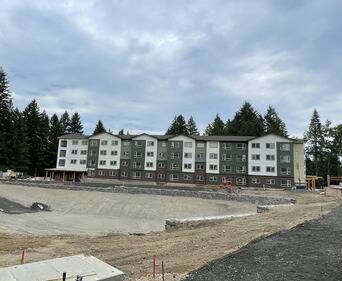Submitted by the Washington State Department of Commerce
Commerce grants help Washington communities take another step toward meeting the projected need for 1.1 million new housing units over next 20 years
The Washington State Department of Commerce today announced $47 million in funding for infrastructure improvements to support 43 construction projects that will provide more than 3,000 units of affordable housing statewide.
Washington state is projected to need 1.1 million new units of housing over the next 20 years. Connecting Housing to Infrastructure Program grants help local governments reduce per unit connection fees, which are used to pay for area-wide improvements to municipal sewer, water and stormwater systems. Grants pay for the below ground infrastructure, such as water and sewer pipes, and to reimburse system infrastructure charges paid by housing developers.
“Addressing the lack of affordable housing in communities all across Washington is crucial to our economy. CHIP grants provide vital infrastructure to jump-start construction of units that will serve households most in need,” said Commerce Director Mike Fong.
Many of the awarded projects announced today will also provide supportive housing for individuals and families experiencing, or at risk of, homelessness.
In this latest application round, Commerce received 74 applications for a total of $79 million. With $55.5 million appropriated this biennium, demand significantly exceeded available resources. Since 2021, and including today’s awards, Commerce has invested more than $88 million in CHIP funding, supporting the creation of over 7,800 affordable housing units.
Eleven of the developments are for projects to encourage homeownership. Most use the community land trust model, where the occupant purchases the home itself while the land is held in a common trust. The home can only be resold at a reduced price to another low-income household for a period of 25 years. These housing developments provide not only a safe place to live, but also an opportunity for families to build equity for long-term financial stability.
“The impact of programs that encourage and support opportunities for working families to own a home is clear,” Fong said. “Individuals build wealth and the community at large benefits from reduced housing insecurity and increased stability.”
“The CHIP awards received by the City of Bellingham have supported the development of over 300 units of multifamily housing. Partnering with Commerce in this way has in turn allowed the City to support even more housing – enabling an additional 16 units to be developed,” said Samya Lutz, Housing and Services Program Manager for the City of Bellingham.
Commerce expects a second round of funding will open for grant applications in the fall of 2024, with $12.7 million available. CHIP prioritizes applications based on select criteria including affordability, project readiness, and consistency with growth management principles. For more information, visit Commerce’s CHIP webpage.




